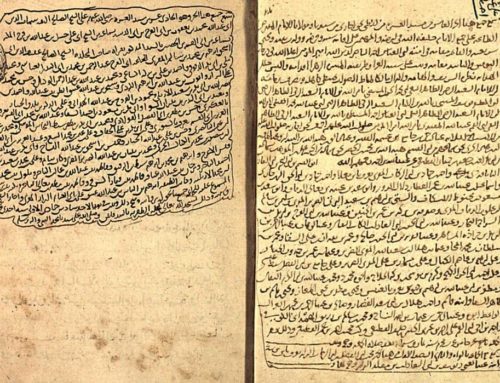Translated by Shazad Khan
Perhaps you might say: Tell me about the pledge (bay’ah):
(1) Is it obligatory or Sunnah? (2) What is the wisdom behind its legislation in Sacred Law? (3) What are the pre-requisites of the shaykh? (4) What are the conditions of one who takes the pledge? (5) How does one fulfil the pledge, and how does one violate it? (6) Is it permissible to repeat the pledge with one scholar or multiple scholars? (7) What are the transmitted words of the pledge?
So I say:
(1) As for the first question; is the pledge obligatory or Sunnah?
Know that the pledge is Sunnah and not obligatory. This is because the folk took the pledge from the Prophet (Allah bless him and give him peace) and sought proximity by it with Allah Most High, and there is no evidence indicating that one who foregoes it is a sinner, neither did any of the Imam’s rebuke anyone who abstained from it.
(2) As for the second question; what is the wisdom behind its legislation in Sacred Law?
Know that the Sunnah of Allah Most High is that affairs which are subtle and hidden in the consciousness are determined by actions and verbal statements. Thus, belief in Allah, His prophet and the Last Day is a hidden affair. Consequently, submitting verbal acknowledgement of this has been designated as a determiner. Likewise the concurrence of the buyer and seller about the merchandise and price is a hidden matter; the offering and acceptance therefore are determiners.
Similarly, penitence, having a firm resolve to abstain from sin and clinging to the rope of God-consciousness are all hidden matters. Consequently, the pledge has taken its place.
(3) As for the third question; what are the pre-requisites of a shaykh?
(a) Knowledge of the Book and Sunnah. I do not mean the highest degree in their knowledge, rather it suffices one to have studied: The exegesis of Madarik, Jalalayn or any other similar Qur’anic exegesis with a scholar and mastered its’ rare lexical items, causes surrounding the revelation, grammatical inflections, stories and other related matters.
To have studied books like Masabih or Mashariq. To have mastered its’ meanings, rare lexical items, difficult inflections and the interpretations of the legal jurists.
He is not required to have memorised the Qur’an or to have examined the biographies of the [hadith] narrators. Do you not see that the Followers and Successors used to accept disrupted and interrupted chains of hadith? This is because the objective is to attain a plausible degree of certainty through the chains of transmission back to the Emissary of Allah (Allah bless him and give him peace).
Neither is he required to have studied principles of jurisprudence, theology and hypothetical matters related to fiqh and fatwa.
We have stipulated the pre-requisite of knowledge because the objective of the pledge is to command the lawful and prohibit the unlawful, to guide him to the attainment of inner peace, to remove bad traits, attain noble traits and that the traveller obey the shaykh in all matters mentioned above. How can this be expected of one without knowledge?
The shaykhs have unanimously stated that none should take-up oratory except after having read the Qur’an and written hadith.
Perhaps at the very least it would suffice with someone who has had a lengthy association with God-fearing Scholars, acquired decorum from them, who is ever-investigating the lawful and unlawful and ever-halting at the Book of Allah Most High and the Sunnah of His Messenger (Allah bless him and give him peace). Allah knows best.
(b) To have uprightness and God-fearingness. It is obligatory that the shaykh abstain from enormities and not persist in minor sins.
(c) To be abstinent from this-worldly affairs and enthusiastic about next-worldly affairs, persistent in emphatic works and invocations transmitted through rigorously authenticated hadiths, perpetually attached with his heart to Allah the Exalted and having an experiential attachment of the heart with Allah Most High as a firmly rooted trait.
(d) To command the lawful and prohibit the unlawful and not be obstinate, characterless and unmanly but rather possess a great intelligence so that he can be relied upon in what he commands and prohibits. Allah Most High states:
“… from amongst witnesses with whom you are well pleased” (Quran 2:282)
So what do you suppose regarding a shaykh?
(e) That he have been tutored by the shaykhs and have remained in their company for a considerable amount of time and taken esoteric light and tranquillity from them. This is because it is the Sunnah of Allah that no one succeeds save he who beholds the successful; like knowledge is attained through association of the knowledgeable and likewise is the case with all professions.
It is not a pre-requisite that he manifest miracles and supernatural feats nor is it necessary that he leave earning a livelihood. The former is the result of abstinence; not a pre-requisite of perfection. The latter is contrary to Sacred Law. Do not be deluded by those who are overcome by their spiritual states; nothing has been transmitted except that one be content with little income and abstain from the doubtful.
(4) As for the fourth question; what are the conditions of one who takes the pledge?
Know that it is obligatory that one who takes the pledge be pubescent, sane and eager. A hadith states that a child was presented before the Prophet (Allah bless him and give him peace) so that he may take the pledge. The Prophet (Allah bless him and give him peace) rubbed his head and prayed for blessings for him and did not take the pledge from him.
There are some shaykhs who allow taking the pledge from minors as a means of blessings and good omen. Allah knows best.
(5) As for the fifth question; how does one fulfil the pledge, and how does one violate it?
Know that the pledge, as it has been practised by the Sufis, has many forms.
(a) The pledge of repenting from sins;
(b) The pledge of seeking divine blessings, akin to the chains of hadith transmitters, there are great blessings in this;
(c) The pledge of emphatic strictness in sincerely upholding the command of Allah and avoiding what He has prohibited outwardly and inwardly and to attach the heart with Allah Most High. This is the main form.
As for the former two forms of the pledge, its’ fulfilment is by leaving enormities, not persisting in minor sins and to cling to the aforementioned obligatory and emphatic works. One violates it by forgoing these instructions.
As for the third form of the pledge, it is fulfilled by remaining steadfast on this abstinence and spiritual struggle until the traveller becomes enlightened with the light of tranquillity so that this becomes a perpetual trait and second nature to him. He is then given the dispensation to pursue what Sacred Law has permitted him like delicacies and pursuits which normally require a lengthy time like teaching and giving formal opinions (fatwa). One violates it by forgoing the aforementioned.
(6) As for the sixth question; is it permissible to repeat the pledge with one scholar or multiple scholars?
Know that repeating the pledge has been transmitted from the Messenger of Allah (Allah bless him and give him peace) and from the ancient Sufis.
As for repeating it with two different shaykhs, if it is due to the manifestation of a fault in the shaykh then it is valid, as is the case if the shaykh has passed away or has disappeared.
As for when it is without a valid cause it is likened to one who plays with his religion. It removes blessings and turns the commitment of the shaykhs away from giving him instruction.
(7) As for the seventh question; what are the transmitted words of the pledge?
Know that the words transmitted from the pious forebears for the pledge are:
All praise belongs to Allah; we praise Him, seek His succour, seek His forgiveness, and seek his refuge from the evil of ourselves and misdeeds. Whomsoever he guides none can misguide, and whomsoever He misguides none can guide. We bear testimony that there is no deity save Allah alone without partner. We bear testimony that Muhammad is His servant and messenger, Allah bless him, his folk and Companions and give them peace.
Then he repeats:
I believe in Allah and all that has come from Allah according to the wont of Allah.
I believe in the Messenger of Allah and all that has come from the Messenger of Allah according to the wont of the Messenger of Allah.
I am disconnected from all religions except Islam.
I am disconnected from all sin.
I have submitted and bear testimony that there is no deity save Allah and I bear testimony that Muhammad is his servant and messenger.
I take the Pledge from the Messenger of Allah (Allah bless him and give him peace) through his successors upon: (1) testifying that there is no deity save Allah; (2) testifying that Muhammad is His messenger; (3) establishing prayer; (4) giving zakat; (5) fasting the month of Ramadan and (6) performing the Hajj, if I possess the means to perform it.
I take the pledge from the Messenger of Allah (Allah bless him and give him peace) through his successors that I will not believe in a co-sharer with Allah, I will not steal, I will not fornicate, I will not kill, I will not slander and I will not sin.
Then the shaykh recites these two verses:
“Oh Believers, fear Allah and seek a means to attain Him, and struggle in His path so that haply you may prosper.” (Qur’an 5:35)
Verily those who swear fealty to you are only swearing fealty to Allah: Allah’s hand is above theirs. So he who violates his oath but violates it against himself; and whoever fulfils his covenant to Allah, He shall give him a tremendous wage. (Qur’an 48:10)
Thereafter, the shaykh prays for himself, for the disciple, for all present, and say “Allah bless us and benefit us.”
There is no harm in repeating “I have taken the Naqshbandi, Qadiri or Chishti paths which are linked to Shaykh Khwajah Naqshband, Shaykh ‘Abd al-Qadir al-Jaylani and Shaykh Mu’in al-Din Sanjari, may Allah grant us its opening and raise us amongst His friends, with your Mercy of Merciful of compassionate ones” Amin.
I heard my father say, “I saw the Messenger of Allah in a dream and I took the pledge from him and he held my hands between his hands. This is why I hold the hand in this manner.”
As for the pledge of women; it is performed by the shaykh taking hold of one end of a cloth and the woman the other end of the cloth. Allah knows best.
pp19-38 S. Waliullah n/d. al-Qawl al-Jamil. Islami Academy: Lahore.







Can you please the words of pledge in it’s original language?